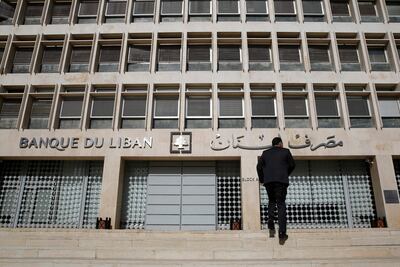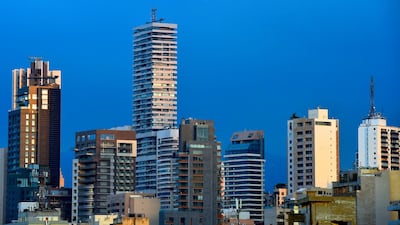Moody's Investors Service put Lebanon's Caa1 rating under review for a downgrade within three months, as citizens took to the streets this week demanding banks remove curbs that have limited foreign currency withdrawals.
In a statement on Tuesday, the rating agency said the decision to put the country under review “reflects the recent significant tightening in external financing conditions and the reversal in the bank deposit inflows that are essential in enabling Lebanon to meet the government's financing needs."
Combined, these have "aggravated already worsening balance of payments dynamics," and "anticipated external financial assistance has not yet been forthcoming and capital market access at sustainable rates remains elusive.”
Moody's downgraded Lebanon to junk status or non-investment grade last January. Lebanon has traditionally relied on capital flows from its citizens working abroad in the Gulf, Europe and the US. Banks have historically offered high interest rates on Lebanese bank deposits and on fixed term dollars deposits. The capital inflows allowed the country to escape unscathed from the 2008 financial crisis as it received on average $1 billion (Dh3.67bn) a month that helped it meet financing needs, which today are estimated at over 30 per cent of gross domestic product (GDP).
However, the outbreak of war in neighbouring Syria in 2011 and the influx of a million refugees crimped growth which exacerbated existing structural imbalances in Lebanon’s economy. Starting May 2019, year-on-year deposit growth has turned negative, according to Moody’s.
The country received pledges for $11bn at the CEDRE international donor conference in Paris last year that were tied to the government implementing structural reforms and reining in spending. However, none of those funds have come through due to lack of implementation of the required reforms.

Until Syria’s civil war, Lebanon had managed to remain resilient despitea month-long war with Israel in 2006, internal political differences that led to civil strife in 2008, and a presidential vacuum. It did so by relying on its economy expanding at a higher pace than the growth of its public debt, which was amassed following a 15-year civil war as the country sought to rebuild itself.
Lebanon's debt reached $86bn at the end of July, about 150 per cent of GDP, according to official data, ranking it among the top three most-indebted nations. The budget deficit reached 11 per cent of GDP in 2018, up from 8.6 per cent in 2017.
The government's greater reliance on the Lebanese central bank's drawdown on foreign exchange reserves to meet upcoming foreign-currency bond maturities “risks destabilising the bank's ability to sustain the currency peg and ensure financial stability over the longer term under current balance of payment trends,” Moody’s said.
Riad Salame, who has been at the helm of Lebanon's central bank since 1993 and credited with shielding the country in the most difficult of times has repeatedly said there is no shortage of dollars in the market and that talk of the currency's scarcity is exaggerated. The central bank has about $38.5bn in foreign currency reserves, which is enough to service the country's debt, and holds more than $10bn in gold holdings placing it among the top 20 regulators.
Lebanon’s government foreign currency debt service in 2020 is about $5bn, in addition to $1.5bn maturing next month. Moody's said it could confirm the country’s Caa1 rating if the review were to conclude that functioning government policy and forthcoming external financial assistance disbursements would “ease immediate external and liquidity risks and support the growth outlook”.
On Tuesday Lebanon's central bank issued guarantees to secure US dollars for local banks at the fixed official rate (1,507.5 pounds to the dollar), to cover imports of fuel, wheat and medicine with the aim of easing demand for the greenback.
Moody's said the review may extend beyond 90 days and allow it to review the government's progress in adopting the 2020 budget.
“The review will assess whether Lebanon is likely to be able to obtain external financial assistance or renewed capital market access at sustainable rates, without which, a significant share of usable liquid foreign exchange resources--adjusted for the banks' negative net foreign asset position--will likely be consumed by debt service payments in 2019 and 2020,” Moody’s said. Such a scenario would “potentially destabilizing the currency peg and/or prompting a debt rescheduling or other credit negative liability management exercise, the increased risks of which may warrant repositioning the rating at a lower level.”
Lebanon is famous for never defaulting on debt payments even at the height of its 1975-1990 civil war.
“We are now working on the issue of chaos among some [currency] exchange offices and this issue is on the track,” Prime Minister Saad Hariri said in an emailed statement. “I am not saying that we do not have problems, but we are working day and night to address the current situation, while others are propagating rumours via WhatsApp or others and this is what we are facing now … We can no longer spend more than our income and accumulate debts on the country. We must put an end to this debt by reducing payments and increasing revenues and this is what we are seeking through CEDRE, McKinsey or others. The financial situation is difficult but not impossible. We can save the country, and this requires courage and bold decisions.”
Moody’s said a decision to downgrade the country’s rating would take place “if the review were to conclude that Lebanon's fiscal, liquidity, bank deposit and balance of payments dynamics will likely continue to weaken, potentially destabilising the currency peg and/or increasing the risk of an imminent debt rescheduling or other liability management exercise that may constitute a default.”
The government's inability to comply with the conditions attached to the disbursement of CEDRE funds which included the adoption of the 2020 budget before the end of this year, or failing to secure anticipated bilateral support from other lenders, to ease immediate liquidity pressures would prompt the action, Moody’s said.
“We all know the government needs to take measures and cannot rely indefinitely on the banking sector and this is another reminder for the authorities to take in-depth and credible reform measures that would generate a positive shock in the financial market and private sector,” said Nassib Ghobril, chief economist of Byblos Bank. “It’s a question of confidence ... they need to take measures to boost confidence.”


